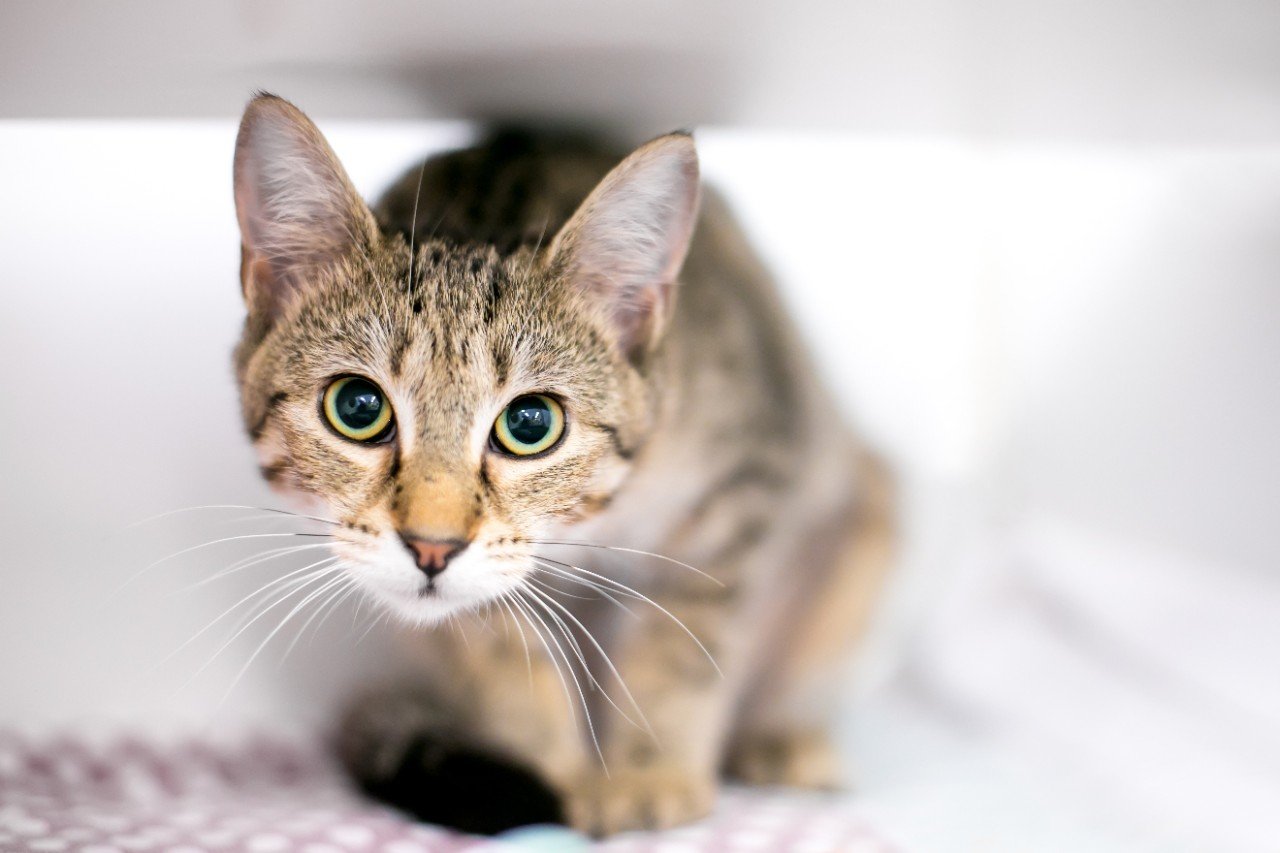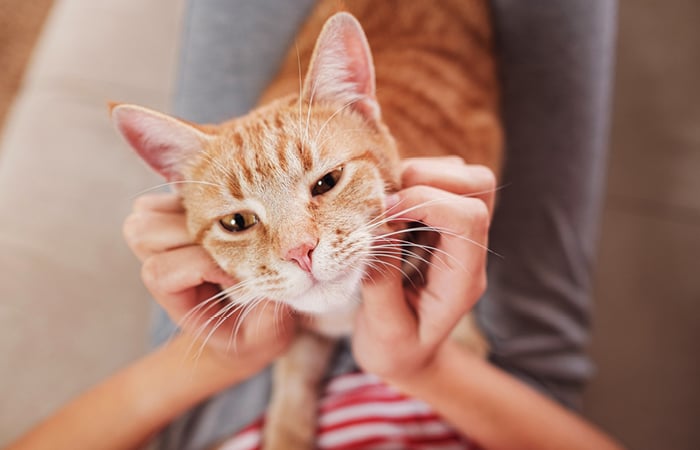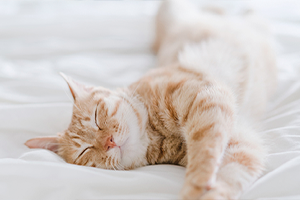What are cats scared of?
Quick Links
What are cats afraid of?
Some cats are naturally more fearful due to their genetic make-up, while others – especially larger, stronger breeds such as Maine Coons, Bengals and Turkish Vans – may appear more confident. Socialisation in the first two months of a kitten’s life plays an even bigger role than genetics or breed, however.
Our cats can be scared of all sorts of things around and outside the home, some of which may be obvious (like the neighbour’s dog!) to more unusual fears such as plastic bags, balloons or fans. Here, we look at some widely reported cat fears – and find out what’s actually going on.
Loud noises
Thunder cracks and fireworks can frighten us, so imagine how terrifying they must be to a cat with highly sensitive hearing, and no understanding of storms or Bonfire Night! Don’t miss our top tips for easing acat’s fears during firework season, including how to gradually desensitise them to the sound.
In the home, cats are often scared of noisy household appliances, especially if they didn’t become accustomed to them as young kittens. Vacuum cleaners, lawnmowers, printers, washing machines and hairdryers are common culprits.
As with fireworks, if your cat has a pronounced noise phobia, it may help to acclimatise them to troubling sounds at a very low volume, and gradually build up their tolerance. This needs to be done very slowly and carefully, however, allowing your cat to leave the situation at any time – read our expert advice on dealing with noise phobia.
Watch our video for an overview of cat fears – and why not share it on social media to help your fellow cat owners? Read on for more detail.
Mirrors
Do mirrors scare cats? Well, many cats ignore them completely, while others have a more complicated, fight-or-flight reaction. Like most animals, cats don’t recognise themselves in a mirror. As a result, they may perceive their own reflection as an unknown cat (made all the more baffling because of a lack of the usual scent they’d expect to pick up!). In these instances, your cat may lash out defensively at the mirror, or run away.
There’s not much you can do to prevent a cat experiencing this fear, other than making sure they can come and go freely from rooms containing mirrors – or distracting them with a treat or bit of fuss. Given time, they’re likely to get used to the fact that a strange and scentless cat appears in a certain part of the house. You can expect your cat to have a good look around and behind the mirror, just to make sure the invader isn’t hiding!
Water
Cats evolved in hot, dry climates where they would rarely get wet. Getting drenched makes your pet feel heavy and cold, spoils their careful grooming and dampens their scent signals. No wonder many cats are afraid of water. But it’s a myth that all cats are: Turkish Vans are the breed most famous for enjoying water and swimming; while even some cats that object to being fully immersed in water may play happily with a running tap – Bengals, for example.
It’s generally easy enough for your cat to avoid water – but if you ever need to give them a clean, it’s best to proceed with caution and follow our advice on washing and bathing your cat to minimise their stress levels.
New furniture
Leaving home
Other cats and dogs
To your cat, a pet dog looks and smells like a predator, so it’s only natural they act scared. With careful introductions for the right individuals, some cats and dogs can get on really well, however. Meanwhile, you may love the idea of your cat making friends with another feline, but cats don’t need company and are mostly territorial creatures. As such, they tend to be hostile or fearful when a newcomer enters their territory.
If you’re introducing a new cat to your existing cat(s), it’s best to do so very slowly, introducing their scents – via a blanket or cloth – to each other first, before gradually progressing to controlled glimpses of the other cat and then short, supervised face-to-face meetings, as per our behaviourist-approved advice. The same gradual approach is best if introducing a cat to dogs.
People
A new person visiting your home smells strange and may act unpredictably in your cat’s eyes, so it’s natural for them to be cautious. Past experiences can play a part, too – for example, being grabbed by a toddler might make a cat frightened of all children.
Overcoming these negative associations takes time and patience. If your cat seems scared of a regular visitor or your new partner, for example, ask the person to sit still and quietly on the floor while they offer your pet some favourite treats. Keep the interactions on your cat’s terms, so they can choose whether to approach the stranger or leave the room, rather than being forcibly petted or picked up.
The truth about cucumbers and cats
A few years ago, viral internet videos showed unsuspecting cats freaking out when their owners placed a cucumber behind them while they ate – prompting millions to Google ‘Why are cats scared of cucumbers?’. Some commentators speculated that the cucumber resembled a snake, triggering an innate fear response in the cats. A more likely explanation, however, is that the unsuspecting pets were simply startled by an unfamiliar object suddenly appearing close to them while they were off guard!
Whatever the reason, the cats were clearly discomforted by the experience in the online videos, so be aware that your pet could be upset by the sudden appearance of any unexpected object in their field of view.
Signs of fear in cats
Many frightened cats will cower and cringe, body tense, ears flattened with large pupils. More subtle signs of fear in cats include licking their nose, blinking quickly (as opposed to slow blinks when they feel safe), or swallowing in the absence of food.
A cat that is afraid might try to hide somewhere inaccessible, get up to a safe, high vantage point or run away – all of which are cats’ preferred ways of coping with stress and conflict. When this doesn’t work, they may feel the need to show aggressive and confrontational behaviour in an attempt to repel and create more distance between them and the thing they are afraid of. They might hiss, yowl, growl and swipe, back arched and fur raised.
A cat who constantly feels anxious or frightened may showsigns of chronic stress, such as pacing, over-grooming or toileting outside their litter tray. This is very bad for the cat’s welfare, so help must be sought.
How can I stop my cat from being scared?
Prevention is better than cure when it comes to scaredy-cats. Kittens have a short ‘socialisation period’ between about two and seven weeks old. If they have repeated, positive experiences of something at this formative age, they’re likely to readily accept it when they encounter it again in the future.
If you’re raising kittens, gently introduce them to noisy appliances (keeping the appliances quiet at first), different types of people, gentle handling and other friendly, healthy, vaccinated pets. This will help them to be less fearful of these things when they grow up. If your new kitten is coming from a breeder or rescue centre, ask what socialisation techniques they use. Cats Protection has a helpful online sound library that you can use to help socialise your kitten to household sounds.
For older cats, try to imagine the fear from your pet’s perspective and devise solutions. A cosy box on a high shelf could allow your cat to keep a watchful eye on the vacuum cleaner or a visiting dog from a safe height. Cover the box in sound-insulating blankets, and it also becomes a welcome retreat from fireworks or thunder.
A plug-in pheromone diffuser may help some cats feel calmer in fear-inducing circumstances, as can trying desensitisation techniques for common fears. Be sensitive to your cat’s feelings, however, and always allow them to remove themselves from scary situations, as forcing them to confront their fears is only likely to make their anxiety worse.
Help – I’m not sure what my cat is afraid of!
Petplan is a trading name of Pet Plan Limited (Registered in England No. 1282939) and Allianz Insurance plc (Registered in England No. 84638), Registered office: 57 Ladymead, Guildford, Surrey GU1 1DB.
Pet Plan Limited is authorised and regulated by the Financial Conduct Authority. Financial Services Register No. 311969. Allianz Insurance plc is authorised by the Prudential Regulation Authority and regulated by the Financial Conduct Authority and the Prudential Regulation Authority. Financial Services Register No. 121849. Pet Plan Limited is a subsidiary of Allianz Insurance plc.

















